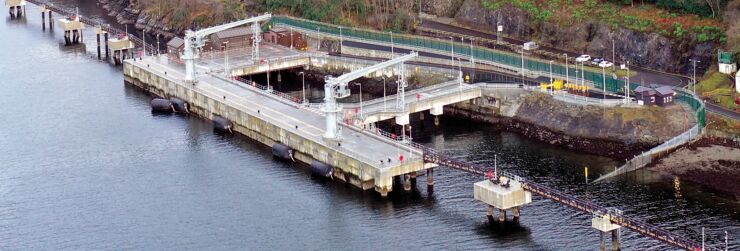
NEC has been used to rebuild a vital Royal Navy jetty in Scotland. The Glen Mallan Northern Ammunition Jetty on the Firth of Clyde serves the nearby Glen Douglas munitions depot, the largest weapons storage facility in Europe. The life-expired 60-year-old jetty needed upgrading and enlarging to accommodate the UK’s new 65,000 t aircraft carriers, HMS Queen Elizabeth and HMS Prince of Wales, which became operational in 2021.
NEC Users’ Group gold member Defence Infrastructure Organisation (DIO), which is part of the UK Ministry of Defence, initially engaged framework contractor Volker Stevin in June 2019 under an NEC4 Professional Service Short Contract (PSSC) to help develop the design and scope for the project. The £67 million design and build contract was then let to VolkerStevin and its designer Arch Henderson under an NEC4 Engineering and Construction Contact (ECC) Option C (target contract with activity schedule) in November 2018. Despite a late requirement to accelerate the programme by three months and the onset of the Covid-19 pandemic in March 2020, the work was finished on time and within budget in December 2021.
The works involved removing the old jetty and building a new 356 m long facility, including a 135 m jetty, two access bridges and five linked mooring dolphins. These were supported on 127 concrete-filled steel tube piles, which varied between 14 m and 52 m in length and were socketed into the underlying bedrock.
The jetty was equipped with two KenzFigee pedestal cranes, continuous fendering, mooring bollards, fire-fighting equipment, stores, back-up generators, modular offices and a CCTV system. It was also provided with two modular floating fender units to keep the carriers’ substantial overhanging decks from contacting the jetty at low tide. The works included building four solar-powered navigation markers on submerged steel towers up to 30 m tall.
HMS Queen Elizabeth loaded stores from the new jetty in March 2021 en route to its first operational deployment (see Issue 116). The scheme won Upgrade and Renewal Project of the Year in the 2021 British Construction Industry Awards and Best Infrastructure Project at the 2020−2021 Scottish Civil Engineering Awards.
Focus on collaboration
The project was procured under the 10-year, £1.3 billion Clyde Commercial Framework which DIO awarded to three contractors in May 2018. The NEC4-based framework is primarily for upgrading the Royal Navy’s nearby Faslane submarine base. Its focus on joint collaborative behavioural training for all parties to help them work in NEC’s required, ‘spirit of mutual trust and co-operation’, plus minimal use of Z clauses, led to it being highly commended for the NEC Contract Innovation of the Year Award in 2019.
DIO project manager Craig MacDonald says framework contactor VolkerStevin was engaged under a simple NEC4 PSSC for some early contractor involvement to help develop an alternative option to the originally developed design. ‘This was invaluable in refining much of the design and scope before the main contract was let. For this we chose NEC4 ECC Option C as it enabled risk sharing between the parties given that the scope was still not 100% defined.’
He says the framework incentivised collaborative working from the outset. ‘Several of the key performance indicators in the framework related to the behaviours, actions and outcomes of collaborative practices. This meant that the client and contractor both had a shared interest in working as closely as possible together to reap the benefits of collaboration.’
MacDonald says prior to starting the main contract, both the client and contractor attended joint collaboration workshops. ‘These were designed to bring the parties closer together, to foster a true team spirit and to explore the benefits of collaboration. I believe these sessions were extremely effective as, once the contract had started, we experienced less adversarial behaviour than would be encountered on a traditional contract, adding significant benefit to delivery.’
Benefits of using NEC
- NEC provided a comprehensive suite of back-to-back contracts for the Clyde Commercial Framework through which this project was procured, with NEC4 PSSC being used for early contractor engagement and NEC4 ECC Option C for the main design and build contract.
- NEC obligation for the parties to work in a ‘spirit of mutual trust and co-operation’ promoted collaborative behaviour, helping to ensure the project was delivered safely, on time and budget despite a late change in completion date and onset of the Covid-19 pandemic.
- NEC early warning and compensation event mechanisms ensured all changes were dealt with in a timely manner, ensuring minimal impact on programme and budget.
- NEC pain/gain share mechanism ensured risk allocation was clear from the outset and incentivised both parties to achieve a successful project outcome.




